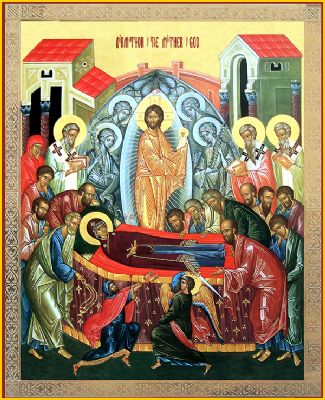|
|||
|---|---|---|---|
| This weekly bulletin insert complements the curriculum published by the Department of Christian Education of the Orthodox Church in America. This and many other Christian Education resources are available at http://dce.oca.org. | |||

The Feast of the Dormition (or Falling Asleep) of the Theotokos is celebrated each year. A hymn of the feast tells us that Mary, after dying as we all do, had the unique experience of being "translated to life by the One who dwelt in her virginal womb." Mary was taken to paradise by her Son. She immediately entered the eternal life that has been prepared for the future of everyone who follows her example of faithful obedience to God. Having lived as a human being like us, the Mother of God now shows us the way to everlasting life with God. The festal hymns also tell us that as heaven receives her, the angels join the apostles in gazing at her with awe. A different view of angels is depicted in a 1987 German movie entitled "Wings of Desire." The actor Peter Falk, who was probably best known as the TV detective Columbo, was featured in the movie, and Falk's obituaries included discussion of its content and meaning. The movie's lead character is Damiel, an angel who (invisibly) watches with loving care over the human inhabitants of Berlin. He helps and comforts people when he can, and pays close attention to the things they do and feel. But Damiel is not happy. He tells another angel that he has become dissatisfied with his inability to share in human life, to physically feel the weight of an object in his hand, or to bleed from a cut. The dissatisfaction grows after a conversation with Falk, whose unnamed character can see Damiel as others cannot because he himself is a former angel. Falk's character tells him how good it feels to rub one's hands together to warm them, or to enjoy a cup of coffee with another person. He encourages Damiel to make the change from angel to human. Damiel does so, and finds love with a trapeze artist to whom he has always been attracted while keeping watch over her life. "Wings of Desire" seems to be making the point that a purely spiritual life, the life of angels, could never be as satisfying as human life with all its "real" problems and joys. But the Church is telling us something quite different in the Feast of the Dormition of the Theotokos. 
We will never be angels, and should refrain from telling children that a person who has died is now an angel; that is not the Church's teaching. Rather, we are called to life in its fullness. Having completed our life on earth, with all the pleasures the movie describes, we are offered the greater gift of eternal life with our Creator. It's not for us to speculate that angels are dissatisfied with their lives. But we needn't be dissatisfied with ours. The Theotokos did what God asked her to do, as we all can. And for doing that she is called "more honorable than the cherubim and beyond compare more glorious than the seraphim"—the highest angels of all. |
|||
